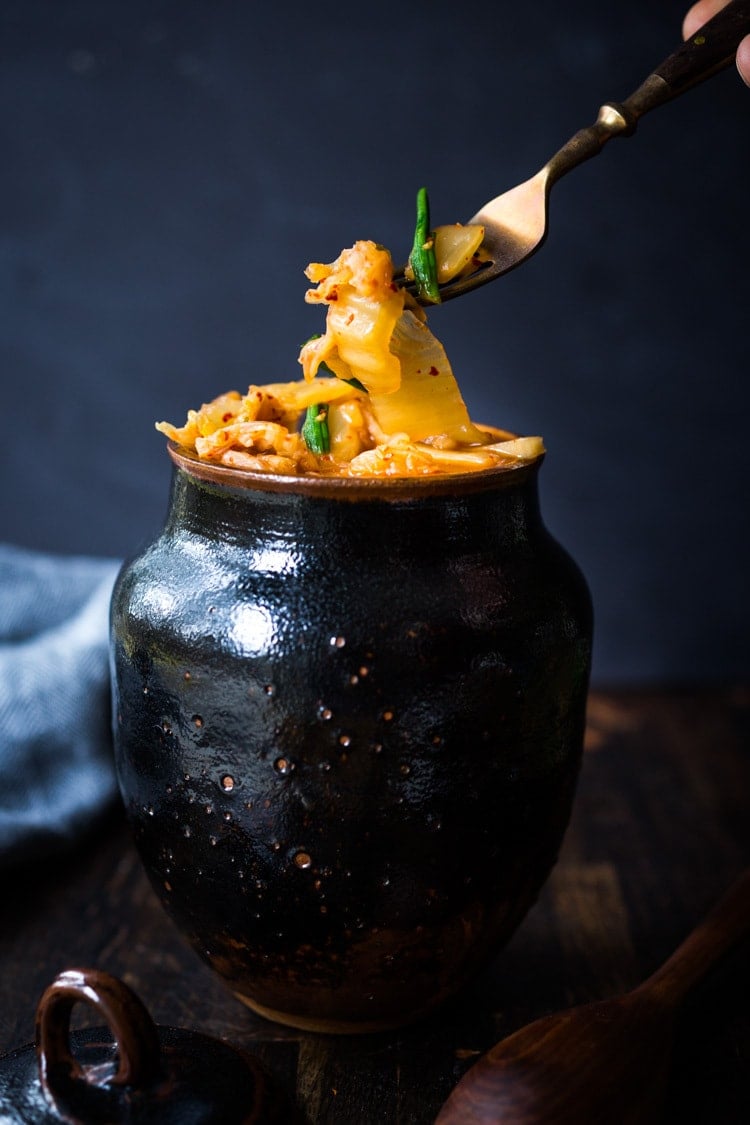 We are never in as much joy as when we are engaged in the well-being of others. ~ Adyashanti
We are never in as much joy as when we are engaged in the well-being of others. ~ Adyashanti many years ago now, we catered a korean wedding. I remember meeting with the bride and prepare and listening identical carefully about the importance of the kimchi being served. It had to be “ just good ” .
truth be told I was aflutter, I had never made it rear then, but the mother of the bride was kind enough to send me her personal kimchi recipe and thankfully I had time to practice it a few times before the big day .
In the end, they were glad. And wherever they are nowadays, I hope they are still. I ’ ve never counted the number of weddings we ’ ve catered, but every then often a couple pop into my mind, most much when I ’ thousand cook, and I can ’ triiodothyronine help but give them a little nod and wish them well .
HOW TO MAKE KIMCHI!| 60-second video
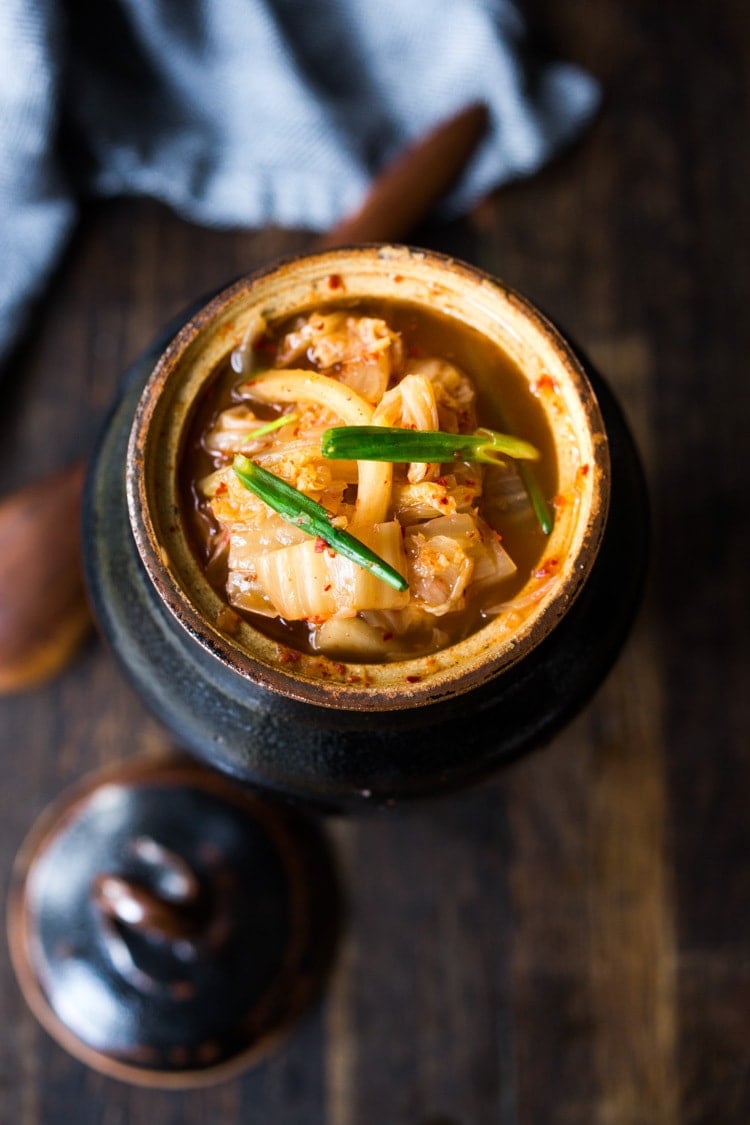
What is Kimchi?
Some of you may still be unfamiliar with kimchi even though it ’ s become highly popular in the last 15 years here in the west. It ’ s basically spicy, ferment cabbage, kind of like sauerkraut, but with korean flavors – garlic, ginger & korean chilies. Kimchi is like the kernel and person of korean cook. And it ’ s tasty with thus many things !
But the best thing about Kimchi ? Kimchi is alive! Full of animation, goodly dependable bacteria, or probiotics, that boost immunity, energize the body, and aid digestion, it is believed to fight cancer, lower cholesterol and regulate rake carbohydrate. Just google it and see for yourself .
now if you are buying kimchi ( which is wholly fine ! ) just make certain it is in the refrigerated section of the grocery store ( then you know it is alive ) and check for preservatives, particularly nitrates- stay off from those. It is normally very well if it is refrigerated !
What does Kimchi Taste like?
Kimchi tastes sour, lemony, piquant, hot, and pungent ! It ’ s similar to sauerkraut in that it is fermented cabbage, but kimchi is packed with flavor, umami and a little ( or a distribute ) of heat ! The zymosis process is what gives kimchi its sourness spirit .
Why eat Kimchi?
Because kimchi is naturally fermented, it is full of healthy bacteria, good for the catgut and thoroughly for immunity. But besides being a healthy thing to incorporate into our diets, Kimchi adds so much relish to things we are already making at home !
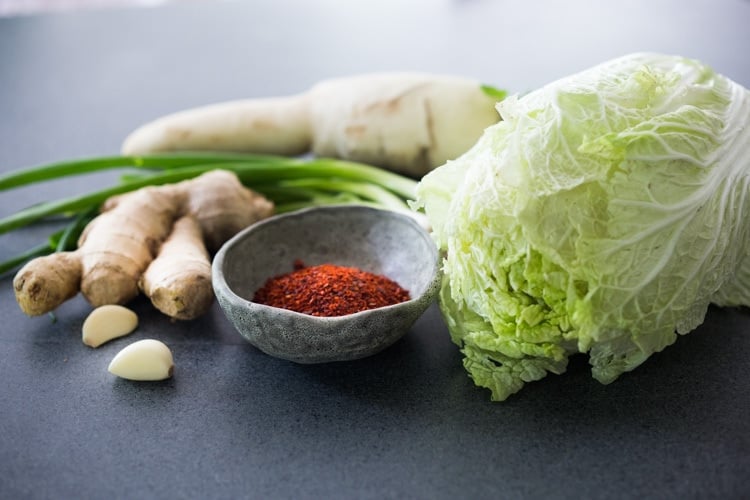
What you’ll need:
This easy kimchi recipe makes enough to fill a big two-quart jar ( about 8 cups ) .
In this recipe, I use korean Chili Flakes called “ Gochugaru ” vs. the Korean fermented Chili Paste called “ Gochujang “. Feel free to use Gochujang if you please or if you have it on hand .
The cause I decided not to use the Gochujang, is Gochujang normally contains MSG and Nitrates, so I went a cleaner path nowadays. wholly up to you .
You can find Gochugaru at most asian Markets or order on-line. You can add other veggies to the mix like matchstick radish radish or carrots .
Vegan Kimchi options:
Kimchi Variations:
- Like so many things, there are so many variations to kimchi, and people have their own personal preferences. I just wanted to provide you with a starting point, and I’m sure you will adapt to your own tastes!
- Some people add sugar, some don’t.
- Some add carrots, some don’t.
- And, to be clear this is not the exact recipe from the mother of the bride, but a little simplified. The ingredients are similar (except I believe she added dried shrimp) but I tried to make this as easy as possible.
- And guess what? It IS easy! And fun!
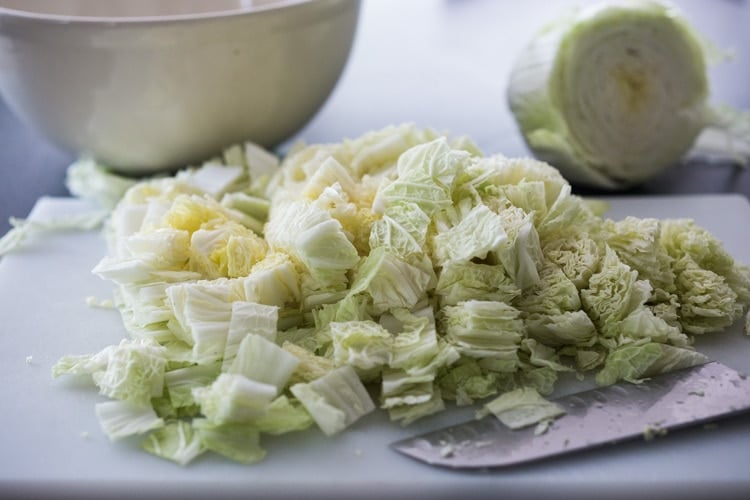
How to make Kimchi (in a nutshell)
****See the recipe for more detail instructions .
- Save 1-2 outer leaves and place in a bag in the fridge (you will use these later).
- Cut the Napa cabbage into 1-inch cubes.
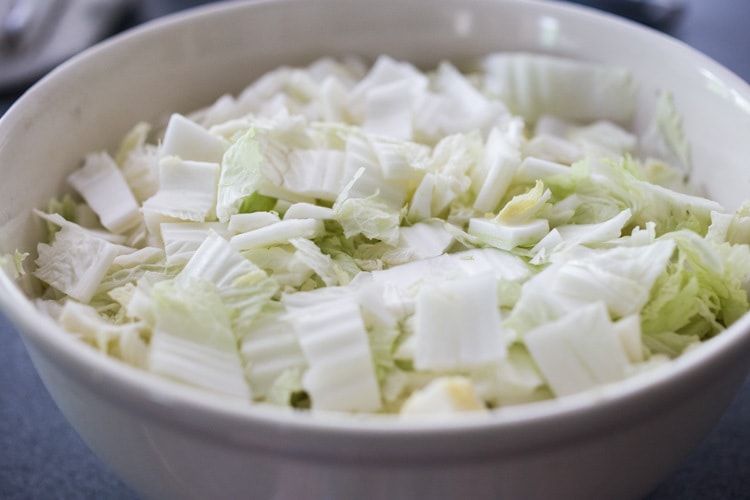
- Place napa cabbage in a bowl and toss with 1/4 cup sea salt.
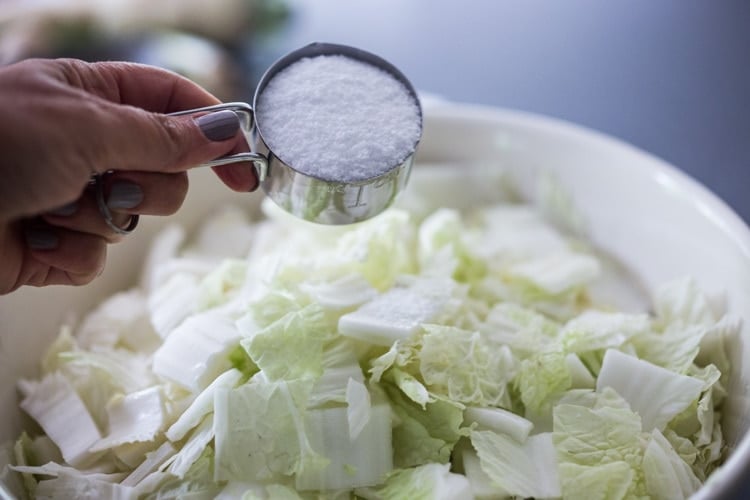
- Fill the bowl with filtered water and stir, and soak cabbage for 6-8 hours.
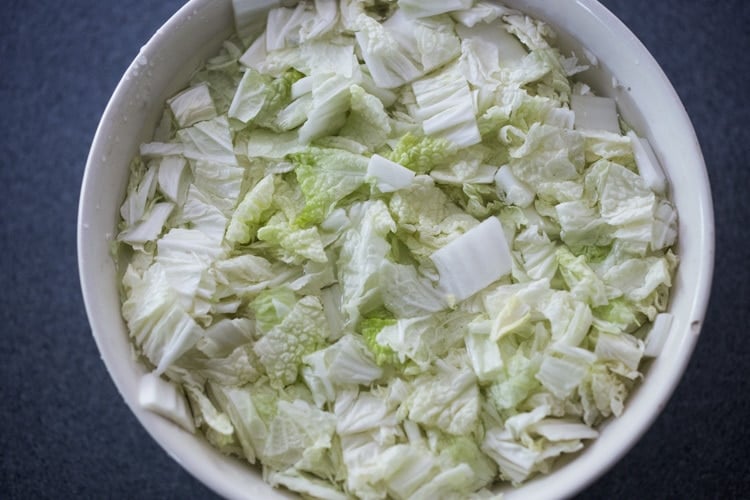
- Place plate over the napa cabbage to keep it submerged.
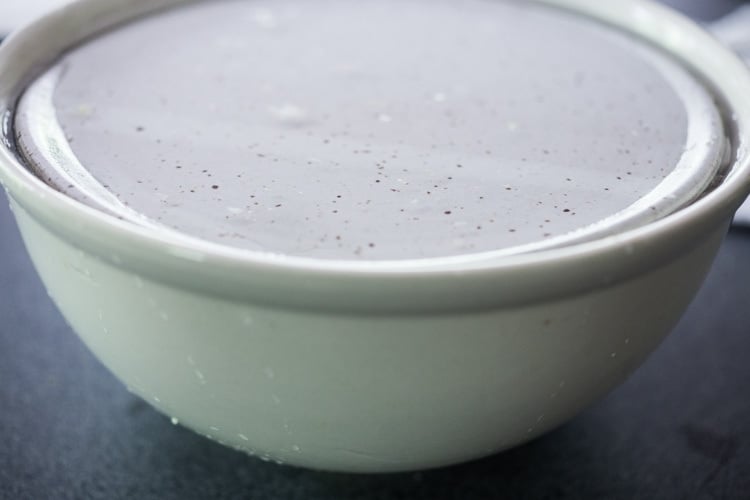
- After 6- 8 hours, drain (making sure to save the brine) and rinse, pressing the liquid out.
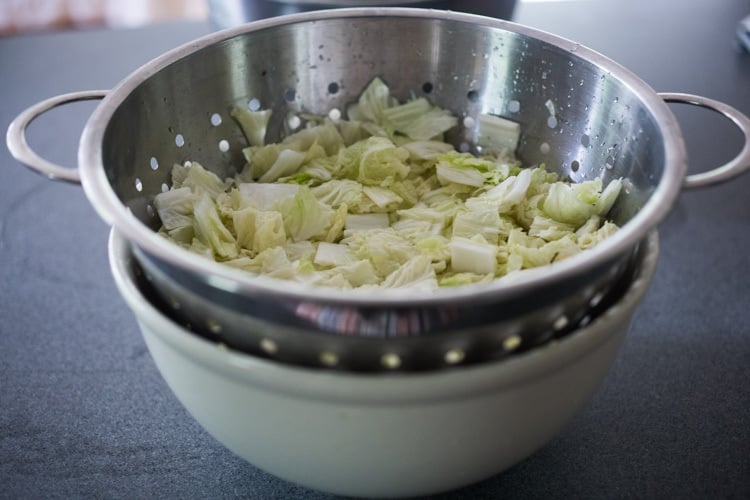
Make the Kimchi Paste:
- As I stated earlier, I prefer to use Korean Chili Flakes called “Gochugaru” vs. the Korean fermented Chili Paste called “Gochujang“. Feel free to use Gochujang if you please. Totally up to you. Either way, you will make the paste below.
- Many people ask if they can use regular old chili flakes- yes, but they are much spicier!!! Gochugaru is fruitier and less spicy, so you can use more and get more flavor. You could try subbing dried Arbol Chilies if you absolutely can’t get the Korean Chili flakes – or even use fresh red chilies to make the paste.
- In a food processor, make a paste with garlic, ginger, shallot, Korean chili flakes (or Gochujang) and optional fish sauce (or miso) and sugar. If you want a mild version, use half the chili flakes. The fish sauce really adds a delicious complexity and depth, but you can, of course, keep it vegan.
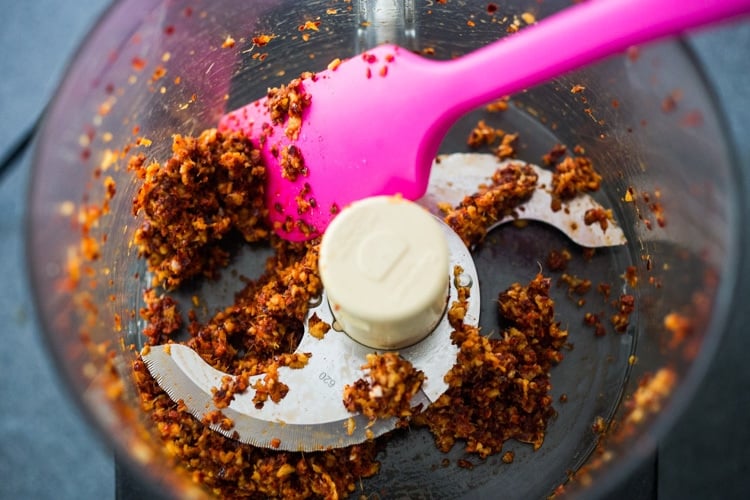
- Peel and cut the daikon radish (or carrot) into match sticks, about 2-3 inches long. Cut the scallions.
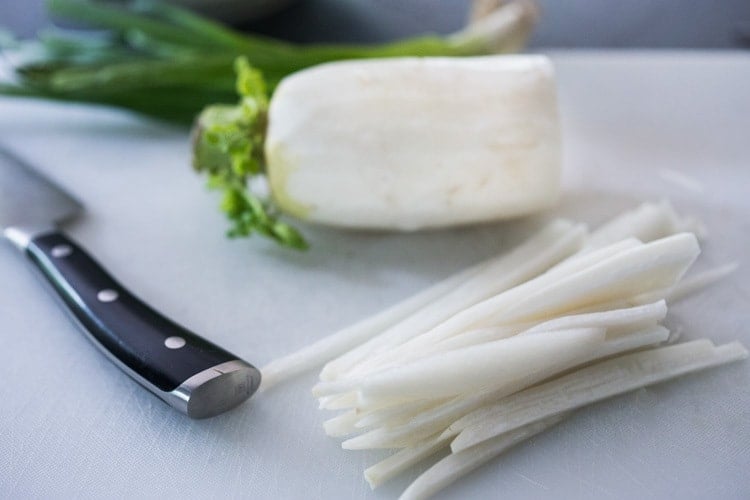
- Cut the scallions into 1-2 inch pieces.
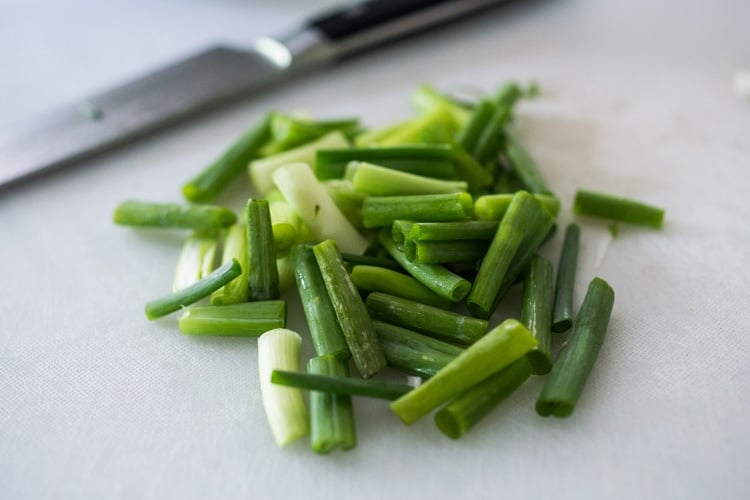
- Place the drained cabbage along with the daikon, scallions and chili paste into the bowl. Massage a bit with gloved hands.
- This is a very mild version shown below, so not very red, ( 2 tablespoons chili flakes).
- You can also add more chili flakes if you want it spicier – I normally add 4-6 tablespoons.
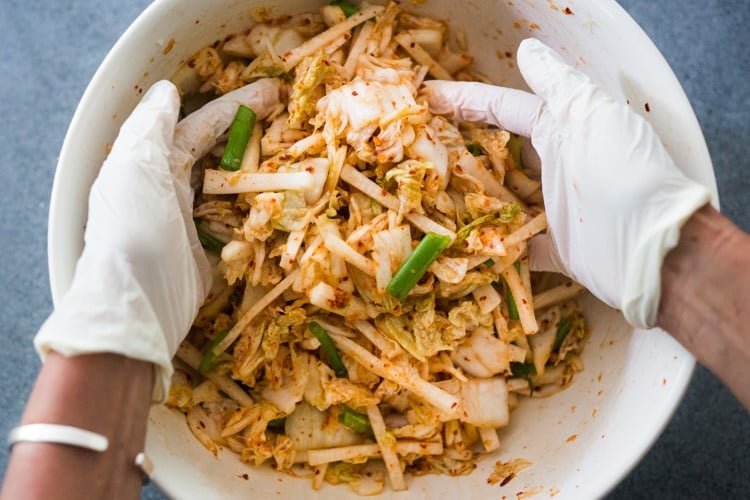
- Pack this tightly into a large two-quart jar (half-gallon, 64 oz) or large crock. (Or use two, quart-sized mason jars.)
- You want a good two inches of space at the top to catch the flavorful liquid that will release.
- I have had great success with this Fermentation Kit that has crystal weights that fit perfectly in a wide-mouth mason jar. It is so convenient for small batch ferments. This fermentation kit includes the jars which is a great option too!
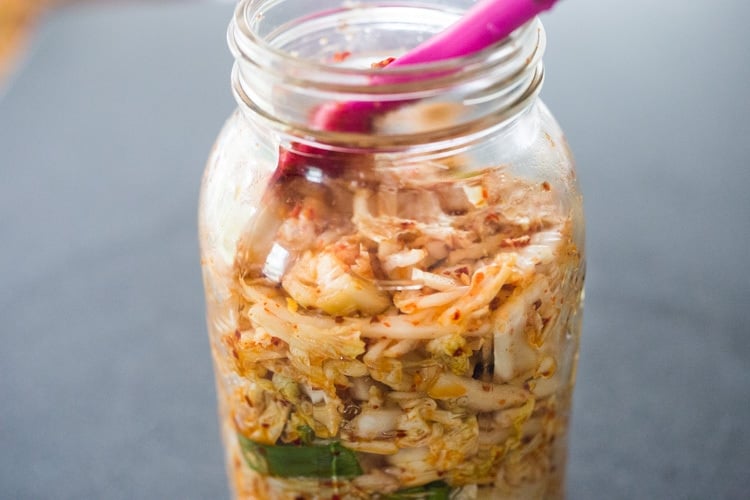
- Pour a little of the brine into the jar, just to enough to cover the cabbage.
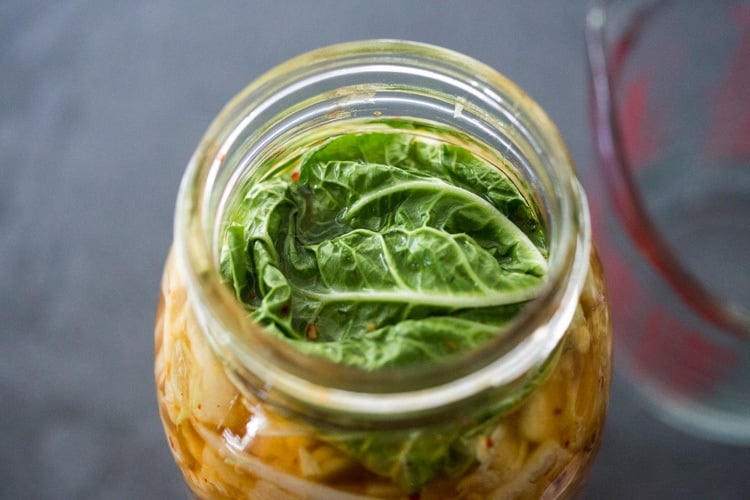
- Cover with the cabbage leaf you saved, and press down. The leaf will help keep the cabbage submerged. Add a fermentation weight to keep the cabbage submerged. Cover with a lid ( do not screw on tight) and place on a rimmed pan or bowl ( to collect any overflow) and set somewhere cool and dark like the basement for 3-5 days. A lower kitchen cabinet away from stove or appliances can also be a good cool spot.
What temperature to ferment Kimchi:
- The ideal temperature for fermenting kimchi 55-65 degrees. 65 F is perfect!
- The cooler it is, the slower it will take to ferment. The warmer, the faster.
- The longer you ferment the tangier and the softer the kimchi will get. I actually prefer slightly crunchy kimchi.
- Going too much over 70 degrees may actually have negative effects on the flavor.
How do you know if kimchi is fermenting?
- After 3 days. Tap the jar to see if any bubbles rise to the top- indicating that it is fermenting.
- Taste the kimchi for tanginess.
- Continue to ferment for 2-3 more days if you want it tangier or softer, then place in the fridge.
- Once you have it in the fridge, taste again. It will continue to ferment but at a much slower rate. It will develop more flavor and complexity over the next two weeks in the fridge, and the spice level will mellow with time!
- Optional: To thicken, use glutenous rice powder.
Storing your kimchi:
- Keep fermented kimchi in a 2-quart jar or crock with the lid on, pressing it down under the brine after each use.
- It will keep for months on end in the fridge when the kimchi is submerged below the brine….getting better and more flavorful with time!
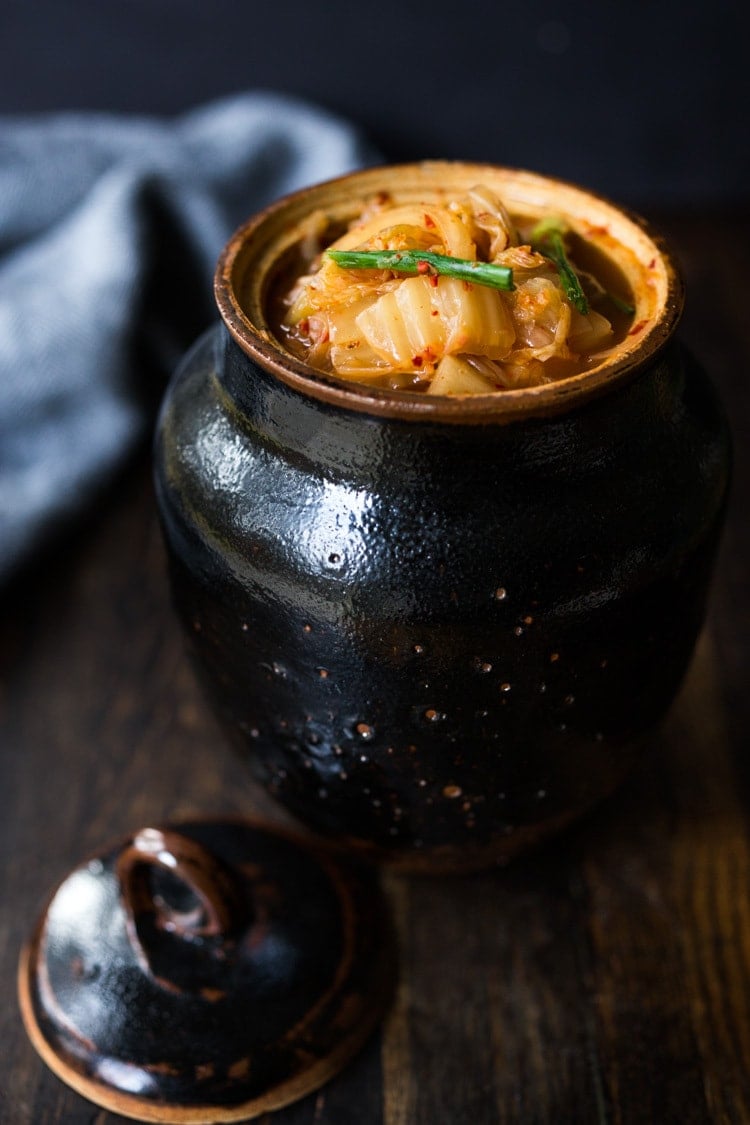
What to Serve Kimchi with:
A huge relish booster, and FULL of natural, gut-healing bacteria that supports your microbiome, boosts your mood, and bolsters your immune system !
***Lately, we ’ ve been using this Fermentation Kit that has crystal weights that fit absolutely in a wide-mouth mason jolt. It is indeed commodious for little batch ferments. This agitation kit includes the jars which is a great option excessively !
More healthy Fermented Foods:
Enjoy the process of making Kimchi ! Tell me how it goes in the comments below .
xoxoxo
Sylvia
PS. It is my hope that through cooking, we not entirely learn fresh ingredients and techniques but besides determine more about the culture and people from which the food we make originates. cook can be a direction of celebrating all our unique and beautiful differences. I ’ d like to believe expanding our repertory in the kitchen can besides expand our hearts vitamin a well .
Rising violence and hate crimes towards Asians hurts all of us. We are not separate, though our minds much tell us so. Our hearts know. If you feel compelled to support or help, I found this article Where to donate to asian Communities useful and enlightening .
And if so incline, visit your own local asian commercialize, a dim-witted, easily way to show support and connect with folks in your own community. here is a helpful list of things I like to stock up on .
Print







